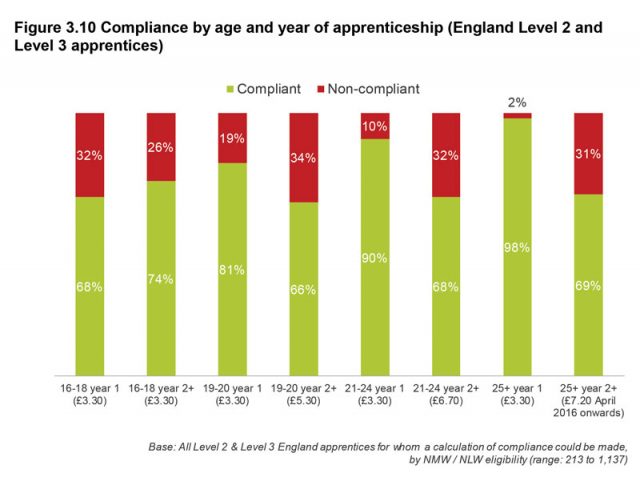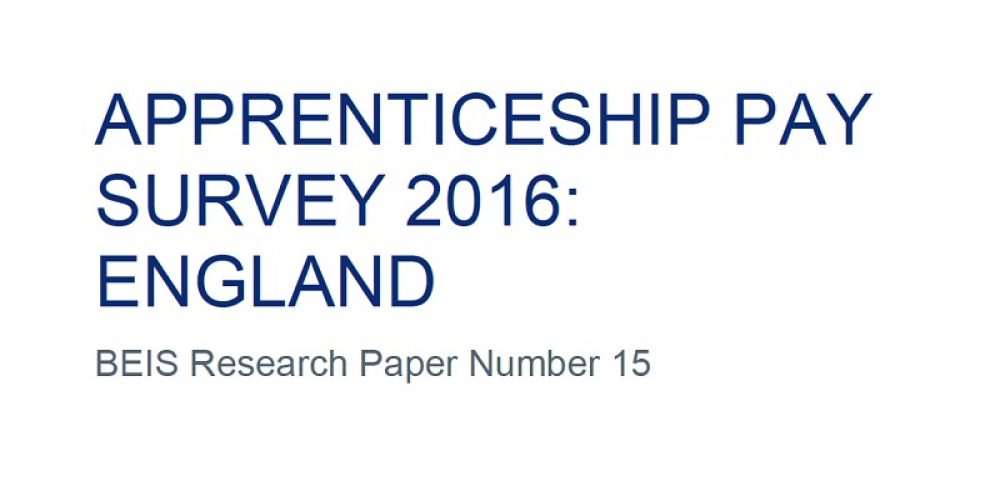Nearly a fifth of apprentices at level two and level three are illegally paid less than the minimum wage, according to the government’s long-delayed apprenticeship pay survey.
Eighteen per cent were found to be paid below the appropriate national minimum wage or national living wage (for workers aged 25 and above), up from 15 per cent in 2014.
The survey, which aims to find whether apprentices are receiving the correct remuneration, was first announced in May 2016, and finally found its way online today.
Hairdressing apprentices are “by far the most likely to have received non-compliant pay”, the survey said, rising to 47 per cent in 2016 from 42 per cent in 2014, while “those on the management framework were least likely” – up to seven per cent in 2016, from three per cent in 2014.
Other sectors with significant non-compliance included construction and related, which rose from 24 per cent in 2014 to 28 per cent in 2016. Health, social care and sport rose from 12 to 17 per cent, electrotechnical was up from 17 to 24 per cent, while hospitality and catering went from nine to 15 per cent.
The 2016 survey was carried out through telephone interviews with apprentices between June 9 and July 25 last year.
In total, “4,963 interviews were conducted with level two and three apprentices in England, and 184 with apprentices on the new apprenticeship standards developed by ‘Trailblazer’ employer groups.”
The figures painted a largely worrying picture at level two and three.
For those aged 16 to 18 or in their first year of an apprenticeship, 13 per cent were paid below the NMW – up three per cent from the 2014 survey. And for ages 19 to 20 and in second year of their apprenticeship, the figure was 32 per cent for 2014, up two per cent last year.
It was a different story for those aged 21 to 24 and in their second year of apprenticeships – with 32 per cent earning below the NMW, down five per cent from two years earlier.
But for the 25+ age group in their second year of apprenticeships, the proportion was up from 23 to 31 per cent.
Non-compliant pay was more common among level two apprentices (20 per cent) than those on level three provision (16 per cent).
The report stressed that “when comparing compliance levels between 2014 and 2016, it is important to note that the lowest NMW rate for apprentices underwent a considerable increase between October 2013 and October 2015 (the rate applicable for the 2016 survey)” – from £2.68 to £3.30. This went up again to £3.50 an hour in April this year.
The new NLW rate came into force from April 2016, creating a new minimum £7.20 rate for all those aged 25 and over or in the second year of their apprenticeship or later.
It was also noted that although levels of non-compliance had increased since 2014, so too had the proportion paid over £9 an hour: 18 per cent last year compared with 15 per cent in 2014.
Commenting on these findings, Mark Dawe, chief executive of the Association of Employment and Learning Providers, said: “The survey clearly shows that if there is a long-term relationship between the apprentice and the employer, the apprentice will on average earn a salary well over the minimum wage.”
But he stressed: “At the other end of the scale, there is absolutely no excuse for paying less than the legal minimum.”
Interim “high-level” results of the survey were released in October, as part of a report for the Low Pay Commission, the independent body that advises the government on minimum wage levels.
These indicated that the proportion of apprentices earning below the NMW had gone up, but months subsequently passed without a full report.
FE Week learned in April that the researchers who carried out the work handed a final draft of their report to the government way back in January.
Mark Winterbotham, the director of the firm which carried out the survey, told FE Week at the time that he didn’t know why it hadn’t yet been published.
He insisted his organisation had handed the final drafts of the reports over to the government in January, but admitted he had “not had any communication since early March” with the research team at the Department for Business, Energy and Industrial Strategy.
The all-party parliamentary group on apprenticeships further recommended earlier this month, in its annual report, that pay for apprentices should be far more flexible, increasing in line with their experience and level of qualification.
It recommended that apprentices’ pay should be increased like this “to ensure that the apprentice route is attractive to as many people as possible”.




Your thoughts